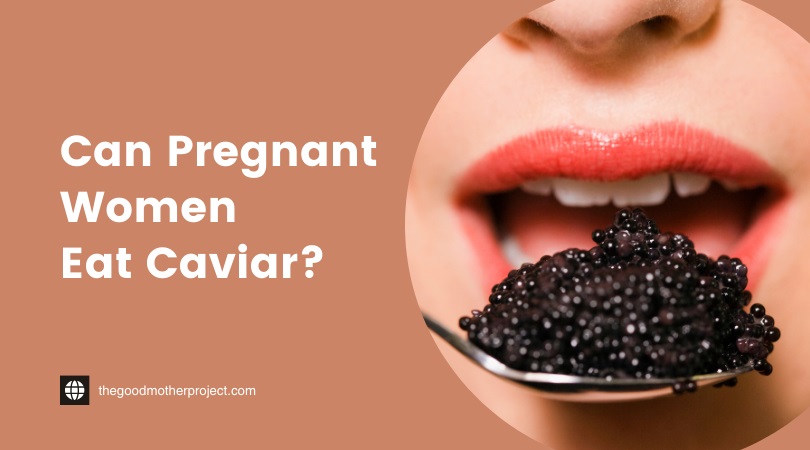Last Updated on January 6, 2025
Pregnant women can eat caviar, but they should do so in moderation. It’s essential to choose pasteurized caviar to minimize health risks.
Caviar, often considered a luxury food, offers a rich source of omega-3 fatty acids, protein, and essential vitamins. Pregnant women may enjoy its unique flavors and nutritional benefits, but caution is necessary. The concern lies in the potential for harmful bacteria and high sodium content found in certain types of caviar.
Choosing pasteurized options can significantly reduce these risks. Always consult with a healthcare provider before introducing new foods during pregnancy. This ensures both mother and baby remain healthy while enjoying culinary delights. Moderation is key, as with any treat, during this special time.
Caviar: A Nutritional Breakdown
Caviar is not just a luxury food. It offers essential nutrients. Pregnant women may wonder about its safety and health benefits. Understanding its nutritional profile is key.
Vitamins And Minerals Galore
Caviar is packed with vitamins and minerals. It supports both mother and baby. Here are some important nutrients found in caviar:
| Nutrient | Benefits |
|---|---|
| Vitamin A | Supports vision and immune function. |
| Vitamin B12 | Helps with red blood cell formation. |
| Iron | Essential for oxygen transport in the body. |
| Magnesium | Supports muscle and nerve function. |
Omega-3 Fatty Acids: Brain Boost For Babies?
Caviar is rich in omega-3 fatty acids. These fats are vital for brain development.
- DHA: Supports cognitive function.
- EPA: Reduces inflammation.
Including omega-3s in pregnancy can help:
- Improve baby’s brain health.
- Support vision development.
- Enhance mood for mothers.
Choosing high-quality caviar may provide these benefits. Always consult a doctor before making dietary changes.
Safety Concerns For Pregnant Women
Pregnant women must be cautious about their food choices. Some foods can pose risks to both mother and baby. Caviar is a delicacy, but it raises safety concerns. Understanding these concerns helps make informed decisions.
Risk Of Foodborne Illness
Caviar can harbor harmful bacteria. Foodborne illnesses can lead to serious complications. Pregnant women are more vulnerable to these infections. Common risks include:
- Salmonella
- Listeria
- Vibrio
To minimize risks:
- Choose pasteurized caviar.
- Avoid unpasteurized products.
- Store caviar properly.
Always check expiration dates. Safe handling is crucial for preventing illness.
Mercury Content: How Much Is Too Much?
Caviar, like other seafood, can contain mercury. Mercury exposure can harm fetal development. Pregnant women need to limit mercury intake. The FDA recommends:
| Type of Fish | Mercury Levels (ppm) |
|---|---|
| High Mercury Fish | 1.0 and above |
| Moderate Mercury Fish | 0.5 – 1.0 |
| Low Mercury Fish | 0.5 and below |
Pregnant women should limit fish with high mercury levels. Consult a healthcare provider about safe fish options.
Recommendations For Consumption
Pregnant women must be cautious about food choices. Caviar can be a delightful treat. However, it’s essential to understand the risks and benefits. Proper recommendations guide safe consumption.
Portion Control: Finding The Balance
Portion control is vital for pregnant women who enjoy caviar. Overindulgence can lead to health issues. Here are some tips for safe consumption:
- Limit servings to small amounts.
- Choose high-quality caviar from reliable sources.
- Consume no more than one tablespoon per week.
Monitoring intake helps balance cravings and health. Always consult a healthcare professional before adding new foods.
Alternatives To Caviar During Pregnancy
If caviar feels risky, consider these tasty alternatives:
| Alternative | Benefits |
|---|---|
| Salmon Roe | High in Omega-3 fatty acids |
| Avocado | Rich in healthy fats |
| Chia Seeds | Loaded with fiber and nutrients |
These options provide similar flavors and health benefits. They are safe and nutritious for expectant mothers.
Frequently Asked Questions
Can Pregnant Women Eat Caviar Safely?
Pregnant women can eat caviar in moderation, ensuring it’s pasteurized and from a reputable source to avoid risks.
What Are The Risks Of Eating Caviar During Pregnancy?
Raw caviar may contain harmful bacteria or parasites that can pose risks to both mother and baby.
Is Caviar High In Nutrients For Pregnant Women?
Caviar is rich in omega-3 fatty acids, protein, and vitamins, contributing beneficial nutrients for pregnant women.
Should Pregnant Women Avoid All Seafood?
Not all seafood is off-limits. Focus on low-mercury options and ensure they are cooked properly.
How Much Caviar Can A Pregnant Woman Eat?
Limit caviar intake to small amounts, ideally once a week, while prioritizing safety and quality.
What Types Of Caviar Are Safest For Pregnancy?
Pasteurized caviar varieties are safest. Look for options labeled as pasteurized to minimize health risks.
Conclusion
Pregnant women should be cautious about eating caviar. While it offers nutritional benefits, the risks of contamination and mercury exposure are significant. Always consult with a healthcare provider before making dietary choices. Prioritizing safety helps ensure both mother and baby remain healthy during this crucial time.








